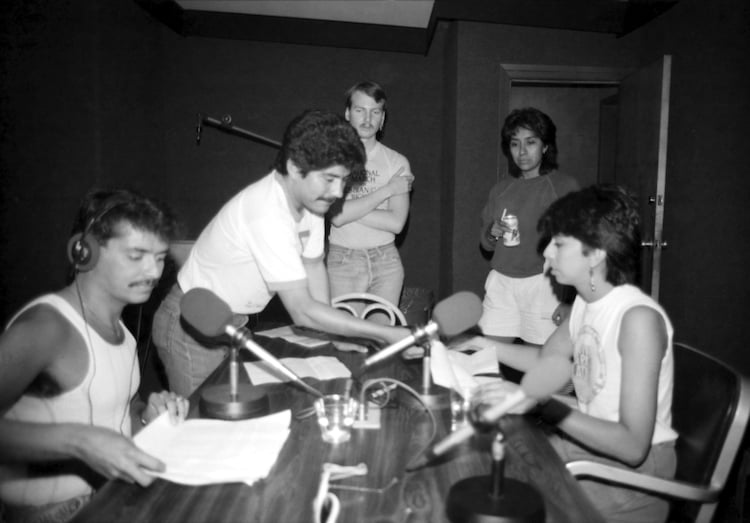
Radio GLLU tapes at the KPFK Studios in North Hollywood in 1986. Radio GLLU made history on the airwaves as the first bilingual LGBTQ+ radio program in the U.S. Radio GLLU was hosted and operated from 1986 to 1997 by the Los Angeles-based Gay and Lesbian Latinos Unidos (also known as GLLU), one of the first LGBTQ+ Latino organizations in the nation. Photo: Louis Jacinto.
“Together On the Air” will be possibly the only exhibit to ever chronicle Radio GLLU, which made history on the airwaves as the first bilingual LGBTQ+ radio program in the U.S.
Radio GLLU was hosted and operated from 1986 to 1997 by the Los Angeles-based Gay and Lesbian Latinos Unidos (also known as GLLU), one of the first LGBTQ+ Latino organizations in the nation.
“Together On the Air,” which will launch online later this month, will explore the legacy of radio as a vehicle for LGBTQ+ Latino community building, belonging, and advocacy.
“Radio GLLU was a lifeline for thousands of queer Latinos,” oral historian and “Together On the Air” curator Ángel Labarthe del Solar said in a statement announcing the exhibit. “Its members fought hard for visibility while also creating a home with each other on the air.
“This exhibition reminds us of the importance of community, chosen family, and connection in movement building and our collective fight toward liberation,”Labarthe del Solar said.
The exhibition will spotlight archival audio recordings and ephemera from the ONE Archives at the USC Libraries as well as personal collections of GLLU members, and newly recorded oral histories with the founders and some members of the organization.
The exhibition will launch online on Dec. 14.
It will be accompanied by in-person programming and a temporary installation at the ONE Gallery in West Hollywood on Dec. 10 from 4:30 to 7 p.m. People can RSVP here.
For the pre-launch event, “Together On the Air: LIVE on Radio,”
Radio GLLU co-hosts Rita Gonzales and Eduardo Archuleta will reunite for a live recording of an exclusive radio program featuring special guests, including playwright and MacArthur Fellow Luis Alfaro, activist Irene Martínez, and historian-author Lydia Otero.
“From the recordings, we hear the heartbeat of the movement and the stories of unity,” Umi Hsu, director of content strategy at the ONE Archives Foundation, said in the statement.
‘Together On the Air’ is about how joy is lived and transmitted through the voices of young LGBTQ+ Latinx activists in the 1980s and 1990s,” Hsu said.



